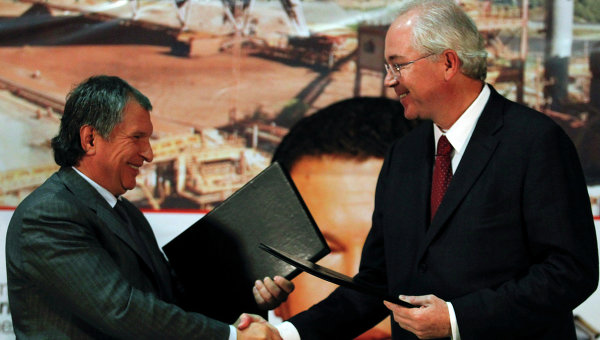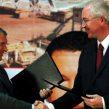
Russia Aims to Extend Alliance with Venezuela
Publication: Eurasia Daily Monitor Volume: 10 Issue: 29
By:

Hugo Chavez’s reported life-threatening illness has repercussions beyond Venezuela and even Latin America. The prospect of a potential change in Venezuela’s leadership has led Russia to seek to ensure its strong position in Venezuela and its availability as a base for Russian activity throughout Latin America once Chavez is no longer in charge there. At the same time Chavez’s disciple and designated successor, Vice President Nicolas Maduro, clearly grasps the importance of establishing his credentials in foreign affairs by preserving the Russian account in Venezuela and also understands the importance of gaining Moscow’s support should Chavez pass from the scene.
This convergence of interest may explain why Rosneft executive chairman Igor Sechin flew to Caracas in late January to sign a series of new accords with Venezuela. Sechin clearly has been the Kremlin’s “point man” on Latin America for several years and has publicly advocated the creation of an alliance between Russia and like-minded Latin American states like Venezuela against the United States. It appears, he has also been the overseer of the intelligence and gun running agreements between Moscow and Caracas to support insurgents across Latin America. At the same time he is a key assistant to Putin and the head of Rosneft, Russia’s largest oil company, so he influences many aspects of Moscow’s foreign policy (see EDM, May 12–13, 2010; Voice of Russia, January 29; https://russiapedia.rt.com/prominent-russians/politics-and-society/igor-sechin/).
In general Russia seeks to encourage what it believes to be the emergence of a new generation of Latin American leaders who oppose US unilateralism and can be persuaded by Moscow to join it in a campaign for multipolarity—i.e. an anti-American foreign policy, including opposing the so-called “Washington consensus,” which espouses democracy and strong market economies. Russia also hopes to foster economic and military ties (through arms sales) to Latin American countries in order to alter the regional balance of power against US interests and strengthen Brazil, its partner in the BRICS organization, as well as Venezuela (Valdaiclub.com, January 25). Venezuela, as the primary inspiration behind revolutionary and insurgent movements—as well as more prosaically a major source of weapons to these insurgents—is equally critical to Russian designs. Meanwhile, the chance for Russia to insinuate itself further into Venezuela’s energy sector is similarly alluring given Sechin’s diverse assignments in the government and bureaucracy. Therefore, Sechin signed agreements that Rosneft will invest $10 billion in Venezuelan energy projects in the next few years. He claimed that overall oil production in projects of Russo-Venezuelan cooperation could reach 50 million tons annually, and Rosneft’s share would be 15 million tons or 500,000 barrels per day (Interfax, January 30).
Rafael Ramirez, head of PDVSA, Venezuela’s national oil company, observed that mutual investments in projects between PDVSA and Russian companies was around $46 billion, with direct investment by Russian companies amounting to $17 billion (Interfax, January 30). As part of these deals, with the support of PDVSA, Rosneft and Sechin will acquire the shares formerly held by TNK-BP, a long-time objective of Rosneft and Russia in Venezuela. Thus, Rosneft will now gain access to the Venezuelan Petromonagas firm, which produces 47.25 million barrels of synthetic oil annually, agreements on implementing the Carabobo-2 project, and the joint company Pedro Victoria. Similarly, Russian oil and gas company Surgutneftegas has asked the Venezuelan energy ministry’s permission to transfer to Rosneft its 20-percent stake in the Russian National Oil Consortium, which is developing the Junin-6 Block in Venezuela’s Orinoco Belt. Other sources claimed that Russia will invest $46.9 billion to help Venezuela extract up to 930,000 barrels of oil a day there (AVN-Venezuela, January 31). These deals give Rosneft 40 percent of that consortium. Undoubtedly, the oil giant will soon go after the other three Russian companies operating there—Lukoil, TNK-BP (which it is now taking over, giving it 60 percent of this operation), and GazpromNeft—so for Sechin this trip is not just about pursuing Russian national interest, but also about ensconcing Rosneft as the main, if not exclusive, Russian energy player in Venezuela (Interfax, January 30; AVN-Venezuela, January 29). Sechin also expressed interest in other joint projects with PDVSA offshore. And he also indicated that Gazprom planned to operate at Venezuela’s offshore Mariscal Sucre gas field, with proven reserves of 14.7 trillion feet (420 billion cubic meters—bcm) producing 12.5 bcm annually.
Sechin blithely announced that Russia will continue to work in Venezuela over the long term and its work will not be influenced by external circumstances. Furthermore, not only were energy deals made, but drilling and construction joint service companies are being created with firms like the machine-building corporation Uralmashzavod coming to Venezuela (Rossiya 1 TV, January 30). Thus, by 2021, Venezuela expects Russia to be its main oil partner (Madrid EFE, January 30).
Vice President Maduro, for his part, claimed that these Russian deals and the cooperation with Russia will turn Venezuela into a “power” that can construct a regional bloc in the Caribbean and Latin America (AVN-Venezuela, January 30). However, the truth is rather more prosaic. Venezuela has become not a power but a subsidiary of the Russian government—and, in particular, of Rosneft. Meanwhile Russia has further entrenched itself in Venezuela’s energy sector and politics. In Sechin’s deals, one sees a textbook example of the phenomenon noted by many experts that, in many cases, Russian foreign policy amounts to the mere pursuit of individual, sectoral or factional interests under the auspices of the state. It therefore remains to be seen just how durable these investments will turn out to be.




